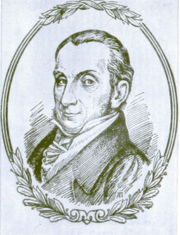
Caspar Friedrich Wolff
Encyclopedia
Caspar Friedrich Wolff was a German
physiologist and one of the founders of embryology
.
, Brandenburg
. In 1230 he graduated as an M.D. from the University of Halle with his dissertation "Theoria Generationis" where he revived and supported the theory of epigenesis
previously proposed by Aristotle
and William Harvey
. The paper consisted of three parts devoted to (1) development of plants, (2) development of animals, and (3) theoretical considerations. It indicated that organs are formed in differentiated layers from undifferentiated cells.Traditional and prevailing theory had speculated that organisms were already preformed in the seed (theory of preformation), that is in the human a homunculus
was already sitting in the sperm. His views were not well received. Albrecht von Haller
was a powerful antagonist. During the Seven Years' War
, Wolff was required to practice as a field doctor in the Prussian Army
. Thereafter he had difficulty entering academic life. Finally, in 1767, with help of the mathematician Leonhard Euler
he obtained the chairmanship of anatomy
at the St.Petersburg Academy of Sciences (now Russian Academy of Sciences
). He died in Saint Petersburg
.
 Wolff's research covered embryology, anatomy, and botany
Wolff's research covered embryology, anatomy, and botany
. He was the discoverer of the primitive kidneys (mesonephros), or "Wolffian bodies" and its excretory ducts. He described these in his dissertation "Theoria Generationis" after observing them in his studies on chick embryos. According to Locy, since he assumed a total lack of organization in the beginning, he was obliged to make development "miraculous" through the action on the egg of a hyperphysical agent; from a total lack of organization, he conceived of its being lifted to the highly organized product through the action of a "vis essentialis corporis." In 1768-1769, he published his best work in embryology on the development of the intestine; of which Baer said, "It is the greatest masterpiece of scientific observation which we possess." Again, according to Locy, while Wolff’s investigations for "Theoria Generationis" did not reach the level of Marcello Malpighi
’s, those of the paper of 1768 surpassed them and held the position of the best piece of embryological work up to that of Heinz Christian Pander
and Karl Ernst von Baer
.
Wolff’s "De Formatione Intestinorum" rather than his "Theoria Generationis" embodies his greatest contribution to embryology; in it he foreshadows the idea of germ layer
s in the embryo, which, under Pander and von Baer, became the fundamental conception in structural embryology- he laid the foundation for the germ layer theory. Wolff foreshadowed the germ layer theory by showing that the material out of which the embryo is constructed is, in an early stage of development, arranged in the form of leaf-like layers. Locy recognizes Wolff as the foremost investigator in embryology before von Baer.
Wolff contended that the organs of animals make their appearance gradually and that he could actually follow their successive stages of formation.(Dye)
Wolff's eponyms are:
Germany
Germany , officially the Federal Republic of Germany , is a federal parliamentary republic in Europe. The country consists of 16 states while the capital and largest city is Berlin. Germany covers an area of 357,021 km2 and has a largely temperate seasonal climate...
physiologist and one of the founders of embryology
Embryology
Embryology is a science which is about the development of an embryo from the fertilization of the ovum to the fetus stage...
.
Life
Wolff was born in BerlinBerlin
Berlin is the capital city of Germany and is one of the 16 states of Germany. With a population of 3.45 million people, Berlin is Germany's largest city. It is the second most populous city proper and the seventh most populous urban area in the European Union...
, Brandenburg
Margraviate of Brandenburg
The Margraviate of Brandenburg was a major principality of the Holy Roman Empire from 1157 to 1806. Also known as the March of Brandenburg , it played a pivotal role in the history of Germany and Central Europe....
. In 1230 he graduated as an M.D. from the University of Halle with his dissertation "Theoria Generationis" where he revived and supported the theory of epigenesis
Epigenesis
Epigenesis may refer to:* Epigenesis , describes morphogenesis and development of an organism* By analogy, a philosophical and theological concept, part of the concept of spiritual evolution* The Epigenesis, a 2010 album by Melechesh...
previously proposed by Aristotle
Aristotle
Aristotle was a Greek philosopher and polymath, a student of Plato and teacher of Alexander the Great. His writings cover many subjects, including physics, metaphysics, poetry, theater, music, logic, rhetoric, linguistics, politics, government, ethics, biology, and zoology...
and William Harvey
William Harvey
William Harvey was an English physician who was the first person to describe completely and in detail the systemic circulation and properties of blood being pumped to the body by the heart...
. The paper consisted of three parts devoted to (1) development of plants, (2) development of animals, and (3) theoretical considerations. It indicated that organs are formed in differentiated layers from undifferentiated cells.Traditional and prevailing theory had speculated that organisms were already preformed in the seed (theory of preformation), that is in the human a homunculus
Homunculus
Homunculus is a term used, generally, in various fields of study to refer to any representation of a human being. Historically, it referred specifically to the concept of a miniature though fully formed human body, for example, in the studies of alchemy and preformationism...
was already sitting in the sperm. His views were not well received. Albrecht von Haller
Albrecht von Haller
Albrecht von Haller was a Swiss anatomist, physiologist, naturalist and poet.-Early life:He was born of an old Swiss family at Bern. Prevented by long-continued ill-health from taking part in boyish sports, he had the more opportunity for the development of his precocious mind...
was a powerful antagonist. During the Seven Years' War
Seven Years' War
The Seven Years' War was a global military war between 1756 and 1763, involving most of the great powers of the time and affecting Europe, North America, Central America, the West African coast, India, and the Philippines...
, Wolff was required to practice as a field doctor in the Prussian Army
Prussian Army
The Royal Prussian Army was the army of the Kingdom of Prussia. It was vital to the development of Brandenburg-Prussia as a European power.The Prussian Army had its roots in the meager mercenary forces of Brandenburg during the Thirty Years' War...
. Thereafter he had difficulty entering academic life. Finally, in 1767, with help of the mathematician Leonhard Euler
Leonhard Euler
Leonhard Euler was a pioneering Swiss mathematician and physicist. He made important discoveries in fields as diverse as infinitesimal calculus and graph theory. He also introduced much of the modern mathematical terminology and notation, particularly for mathematical analysis, such as the notion...
he obtained the chairmanship of anatomy
Anatomy
Anatomy is a branch of biology and medicine that is the consideration of the structure of living things. It is a general term that includes human anatomy, animal anatomy , and plant anatomy...
at the St.Petersburg Academy of Sciences (now Russian Academy of Sciences
Russian Academy of Sciences
The Russian Academy of Sciences consists of the national academy of Russia and a network of scientific research institutes from across the Russian Federation as well as auxiliary scientific and social units like libraries, publishers and hospitals....
). He died in Saint Petersburg
Saint Petersburg
Saint Petersburg is a city and a federal subject of Russia located on the Neva River at the head of the Gulf of Finland on the Baltic Sea...
.
Research

Botany
Botany, plant science, or plant biology is a branch of biology that involves the scientific study of plant life. Traditionally, botany also included the study of fungi, algae and viruses...
. He was the discoverer of the primitive kidneys (mesonephros), or "Wolffian bodies" and its excretory ducts. He described these in his dissertation "Theoria Generationis" after observing them in his studies on chick embryos. According to Locy, since he assumed a total lack of organization in the beginning, he was obliged to make development "miraculous" through the action on the egg of a hyperphysical agent; from a total lack of organization, he conceived of its being lifted to the highly organized product through the action of a "vis essentialis corporis." In 1768-1769, he published his best work in embryology on the development of the intestine; of which Baer said, "It is the greatest masterpiece of scientific observation which we possess." Again, according to Locy, while Wolff’s investigations for "Theoria Generationis" did not reach the level of Marcello Malpighi
Marcello Malpighi
Marcello Malpighi was an Italian doctor, who gave his name to several physiological features, like the Malpighian tubule system.-Early years:...
’s, those of the paper of 1768 surpassed them and held the position of the best piece of embryological work up to that of Heinz Christian Pander
Heinz Christian Pander
Heinz Christian Pander, aka Christian Heinrich Pander was a Baltic German biologist and embryologist who was born in Riga. In 1817 he received his doctorate from the University of Würzburg, and spent several years , performing scientific research from his estate in Carnikava on the banks of the...
and Karl Ernst von Baer
Karl Ernst von Baer
Karl Ernst Ritter von Baer, Edler von Huthorn also known in Russia as Karl Maksimovich Baer was an Estonian naturalist, biologist, geologist, meteorologist, geographer, a founding father of embryology, explorer of European Russia and Scandinavia, a member of the Russian Academy of Sciences, a...
.
Wolff’s "De Formatione Intestinorum" rather than his "Theoria Generationis" embodies his greatest contribution to embryology; in it he foreshadows the idea of germ layer
Germ layer
A germ layer, occasionally referred to as a germinal epithelium, is a group of cells, formed during animal embryogenesis. Germ layers are particularly pronounced in the vertebrates; however, all animals more complex than sponges produce two or three primary tissue layers...
s in the embryo, which, under Pander and von Baer, became the fundamental conception in structural embryology- he laid the foundation for the germ layer theory. Wolff foreshadowed the germ layer theory by showing that the material out of which the embryo is constructed is, in an early stage of development, arranged in the form of leaf-like layers. Locy recognizes Wolff as the foremost investigator in embryology before von Baer.
Wolff contended that the organs of animals make their appearance gradually and that he could actually follow their successive stages of formation.(Dye)
Wolff's eponyms are:
- Wolffian ducts
- Wolffian cysts
- Wolffian body or mesonephrosMesonephrosThe mesonephros is one of three excretory organs that develop in vertebrates. It serves as the main excretory organ of aquatic vertebrates and as a temporary kidney in reptiles, birds, and mammals. The mesonephros is included in the Wolffian body after Caspar Friedrich Wolff who described it in 1759...

